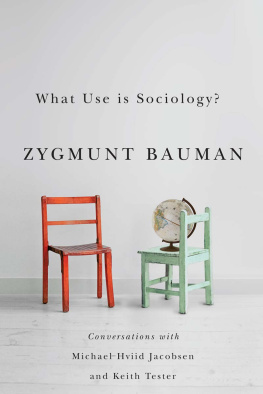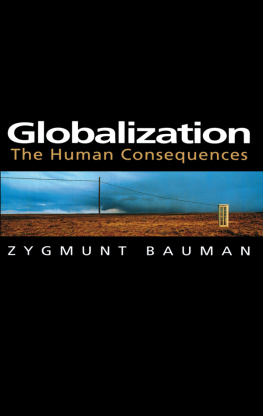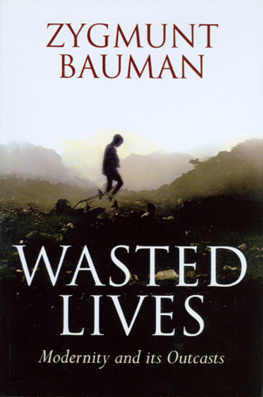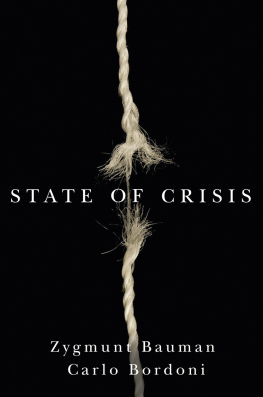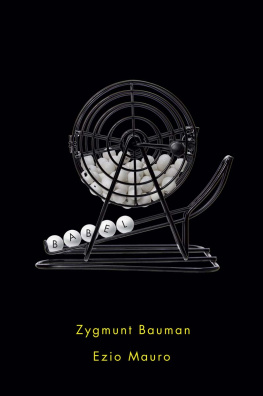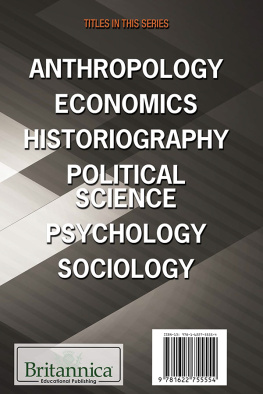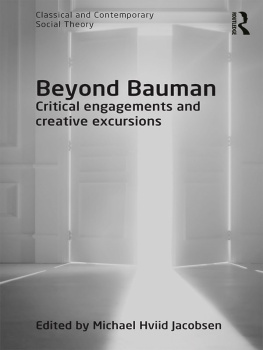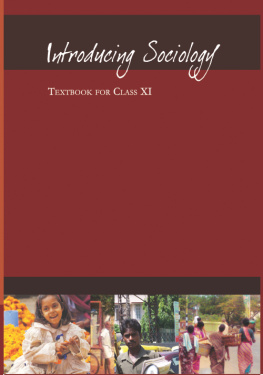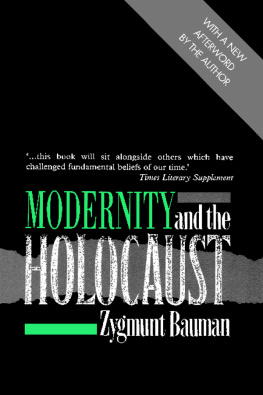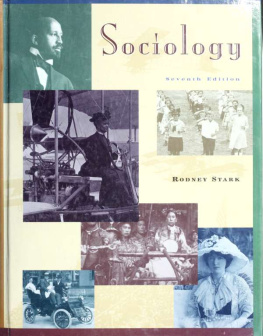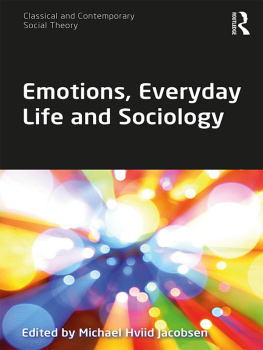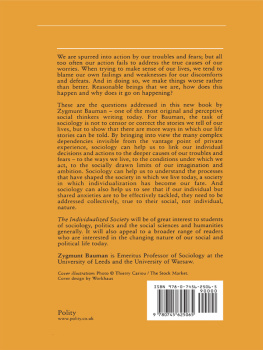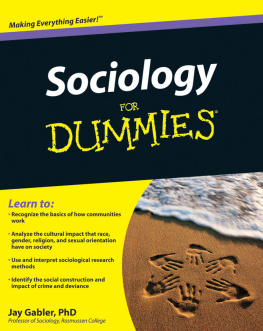What U se Is So ciology?
Copyright Zygmunt Bauman, Michael Hviid Jacobsen and Keith Tester
2014
The right of Zygmunt Bauman, Michael Hviid Jacobsen and Keith Tester to be identified as Authors of this Work has been asserted in accordance with the UK Copyright, Designs and Patents Act 1988.
First published in 2014 by Polity Press
Polity Press
65 Bridge Street
Cambridge CB2 1UR, UK
Polity Press
350 Main Street
Malden, MA 02148, USA
All rights reserved. Except for the quotation of short passages for the purpose of criticism and review, no part of this publication may be reproduced, stored in a retrieval system, or transmitted, in any form or by any means, electronic, mechanical, photocopying, recording or otherwise, without the prior permission of the publisher.
ISBN: 978-0-7456-7988-4
A catalogue record for this book is available from the British Library.
The publisher has used its best endeavours to ensure that the URLs for external websites referred to in this book are correct and active at the time of going to press. However, the publisher has no responsibility for the websites and can make no guarantee that a site will remain live or that the content is or will remain appropriate.
Every effort has been made to trace all copyright holders, but if any have been inadvertently overlooked the publisher will be pleased to include any necessary credits in any subsequent reprint or edition.
For further information on Polity, visit our website: www.politybooks.com
Contents
Preface
This little book seeks to encourage sociologists to identify themselves as the active subjects of a way of addressing the world rather than the value-free technicians of an alleged science. The text consists of four conversations with Zygmunt Bauman, carried out between January 2012 and March 2013, combined with responses to questions, recordings of personal meetings between the three of us, letters and fragments from a couple of texts Bauman has published in less accessible outlets. The material has been arranged into loosely thematic strands in order to establish continuities, resonances and, sometimes, to leave threads deliberately dangling. We have tidied up the grammar where necessary (written English is, we noticed, often very different from spoken English and the latter sometimes looks extremely clumsy on the page) but deliberately done little else to the material. The aim has been to inspire a conversation going beyond the conversations in the book.
The intention is that the book will be used by current and future sociologists to encourage fresh reflection about what we do, why, how and who it is for. It is also an example of a possible different way of writing sociology. The form and content of the book go together. Throughout the aim is to encourage sociologists to apply to our own practice the moral and political message of Baumans work: there is an alternative but it is up to us to make it.
Michael Hviid Jacobsen and Keith Tester
the less managerial, even anti-managerial, more traditional, humanistic variation of sociology aims at making human behaviour less predictable by activating inner, motivational sources of decision supplying human beings with ampler knowledge of their situation and so enlarging the sphere of their freedom of choice.
Zygmunt Bauman in the Polish Sociological
Bulletin, 1967
more than ever we must beware of falling into the traps of fashions which may well prove more detrimental than the malaise they claim to cure. Well, our vocation, after all these unromantic years, may become again a testfield of courage, consistency, and loyalty to human values.
We would be well advised if we carved on the walls of our sociological lecture rooms what Max Weber said more than half a century ago: If the professional thinker has an immediate obligation at all, it is to keep a cool head in the face of the idols prevailing at the time, and if necessary to swim against the stream.
Zygmunt Bauman, Inaugural Lecture, University
of Leeds, 1972
Introduction
The raw stuff processed by the sociological imagination is human experience. The end-product of the sociological imagination called social reality is cast of the metal smelted from the ore of experience. Though its chemical substance cannot but reflect the composition of the ore, the products content also bears the mark of the smelting process which divides the ores ingredients into useful product and waste, while its shape depends on the mould (that is, the cognitive frame) into which the melted metal has been poured.
Zygmunt Bauman, Society under Siege, 2002
There are many different, constantly changing, ever expanding and mutually conflicting uses of sociology. This makes the question of the use of sociology continuously relevant and pertinent. Moreover, the question What use is sociology? is particularly worth asking because sociology is different from almost any other area of intellectual work. Whereas most can identify an object out there which it is their concern to investigate, sociology cannot. Sociology is itself part and parcel of the social world it seeks to explore. It is part of a social world in truth capable of carrying on without the insights of sociology.
There is a long standing tradition, and lots of current practice, which sees this situation as terrible and to be overcome at all costs. Various attempts have been and are made to put a barrier between sociology and the social world. There has been and still is a constant fetishization of methodology, a stress on value neutrality, the development of a specialized and esoteric scientific language designed to confuse the uninitiated, the adoption of the paraphernalia of professionalism all of which function as a barrier between sociology and the world it investigates. In this way, sociology becomes some kind of scientific sorcery that takes on a life of its own far removed and isolated from the life of the human beings it pretends to describe, investigate and analyse. Sociology inside this barrier is said to be scientific and objective because, unlike every social activity sociologists explore, it is pretended to be uniquely free of power, self-interest and bias. The sociologists who seek to hide behind the barricades then attempt to sell their insights or wait to be bought by power through research grants on account of their willingness to march to the passing bells of policy-makers. The business of putting sociology into social life is then handed over to others. The result of all of this desperate denial of the status of sociology as an integral part of the social world it seeks to explore has been little more than the decadence of introspection, a banality of findings, an ideology hiding beneath terminology and last but not least a seduction by power. The result has been, in a word, irrelevance. The world carries on, sociology carries on, and rarely do they ever meet.
As a consequence, sociology needs to be rescued from sociology. This has been known since the late 1950s. American sociologist C. Wright Mills famously separated the sociological imagination from sociology and showed how the practice of the latter has absolutely no necessary connection with the former. Mills made an irrefutable case for the pursuit of a sociological imagination seeking to engage in a conversation with men and women. This conversation would be concerned to show how personal troubles are inextricably linked with public issues. The sociological imagination makes the personal political. It was no coincidence that Mills lined up the practice of the sociological imagination alongside the work of people like novelists and journalists. For Mills, the sociological imagination like novels and journalism enables the development of a quality of mind enabling men and women to understand and to narrate what is happening to them, what they feel and aspire towards. Sociology bereft of the sociological imagination can only provide information, and, as Mills saw, the world already has more information than it can deal with. The world has grown thin in stories, not information, and where stories are thin so too is the ability of men and women to make sense of their lives in its broader historical context. Then they, in Millss words, feel trapped. It is thus the job of the sociological imagination to show how personal life and individual biography is intimately connected with historical events and structural processes. It is the job of the sociological imagination to help people understand the meaning of their epoch for their own lives, and it is the ambition of the sociological imagination, according to Mills, to make a difference in the quality of human life in our time.

